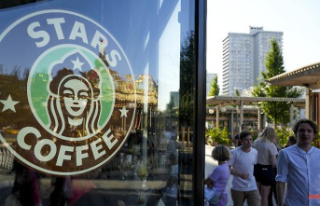Kremlin opponent Navalny is a survivor. Putin's fearless opponent has brought himself back from prison to the Russian public by founding a trade union. Exactly two years ago, he survived an insidious poison attack.
He survived a poison attack two years ago, and Kremlin opponent Alexei Navalny also sees the danger of sudden death as a constant companion in the Russian prison camp. "It is here that torture and killings are most common," Russia's best-known opposition figure said through his lawyers on Instagram. The 46-year-old informed about his three-day solitary confinement in a concrete isolation cell two and a half by three meters - a particularly brutal punishment in the Russian prison system. Navalny's crime: To the annoyance of prison management, he announced the founding of a prisoner's union.
The most prominent opponent of Kremlin chief Vladimir Putin was almost killed in a poison attack with the chemical warfare agent Novichok on August 20, 2020. But even after more than a year and a half in prison, he has lost neither his fighting spirit nor his sense of humor. "Real union struggle is never easy, especially in a prison union." Navalny works there in a sewing workshop.
The politician, who is known for his fight against corruption, repeatedly sues the system in order to disclose grievances. The Kremlin only wants slaves without wills in the prisons, 600,000 inmates are affected, said Navalny. With the reference to inhuman working conditions, he is again noticed in the Russian public for the first time in a long time. The Moscow daily Nezavisimaya Gazeta wrote appreciatively that the initiative to stand up for the rights of workers to fair wages brought Navalny back to the attention of domestic politicians. Even the state media and thus the power apparatus paid attention, as the newspaper wrote in astonishment.
On the other hand, Navalny's sharp criticism of Putin's war of aggression against Ukraine because of Russian media censorship does not get through to the people. He recently complained that the West's sanctions against Russian oligarchs, Putin's mainstays of power, were not working and had to be tightened up. The Russian media also ignore the revelations made by Navalny's team in exile abroad about corruption in the Russian power apparatus. The videos, for example on the riches of Putin's ex-wife Lyudmila or on Foreign Minister Sergey Lavrov, are watched a lot on YouTube.
Political scientist Konstantin Kalachev commented that Navalny was trying to position himself as a popular leader in the aftermath of prison problems, which are familiar to many Russians. There is no longer an opposition critical of the Kremlin in Russia, as can be seen before the regional elections on September 11th. But the power apparatus is now demonstrating that Navalny is "alive and healthy," said Kalachev.
The assassination attempt on the Kremlin opponent in 2020 showed how dangerous dissenters live in Russia. The poison attack is still symbolic of the brutality of President Putin's system, as the documentary film "Navalny", which was also shown in German cinemas in the spring, showed. The film by Canadian Daniel Roher, who met Navalny during rehabilitation treatment in the Black Forest, is primarily about the crime of August 20, 2020.
A killer squad from the domestic secret service FSB, once led by Putin, is said to have applied the deadly nerve agent to one of Navalny's underpants in a hotel room in Siberia. Putin's opponent narrowly escaped death at the time. The images of the spectacular rescue of Navalny, who collapsed screaming on a flight to Moscow, was then taken to the hospital after a stopover in Omsk and finally taken to Germany on a rescue flight, went around the world. The then Chancellor Angela Merkel visited him in the Charité in Berlin.
Western sanctions followed. But Russia denies to this day that there was any crime at all and that it possesses the neurotoxin Novichok, which has been proven by various laboratories. "If someone had wanted that, they would have completed it," Putin said at a press conference on Navalny's murder allegations, whom he never named. Kremlin opponents saw it as a confession by the Kremlin boss. Despite the danger, Navalny returned to Moscow in early 2021 and was arrested at the airport after the plane was diverted, which was noted internationally.
Because of alleged fraud, Putin's fiercest opponent, who would like to be president, is now in penal colony 6 in Melekhovo near the city of Kovrov, about 260 kilometers northeast of Moscow. The conditions there are considered to be particularly tough. In May, a court upheld the nine-year prison sentence. In the same month, Navalny informed about a new indictment by the Russian judiciary. This time it's about extremism and a possible sentence of another 15 years in prison. His anti-corruption foundation had previously been classified as extremist in Russia.
And his constant criticism of the "war of a rabid madman" could land him in trouble for defaming the Russian army. Putin must be stopped, said Navalny. "He needs death, war and lies like drugs to stay in power." Despite imprisonment, the father of two is unbroken. When he is sad, Navalny wrote, he thinks of his wife Julia. In a declaration of love for her birthday this summer, he noted: "It's easy for me to sit in because I have you."












